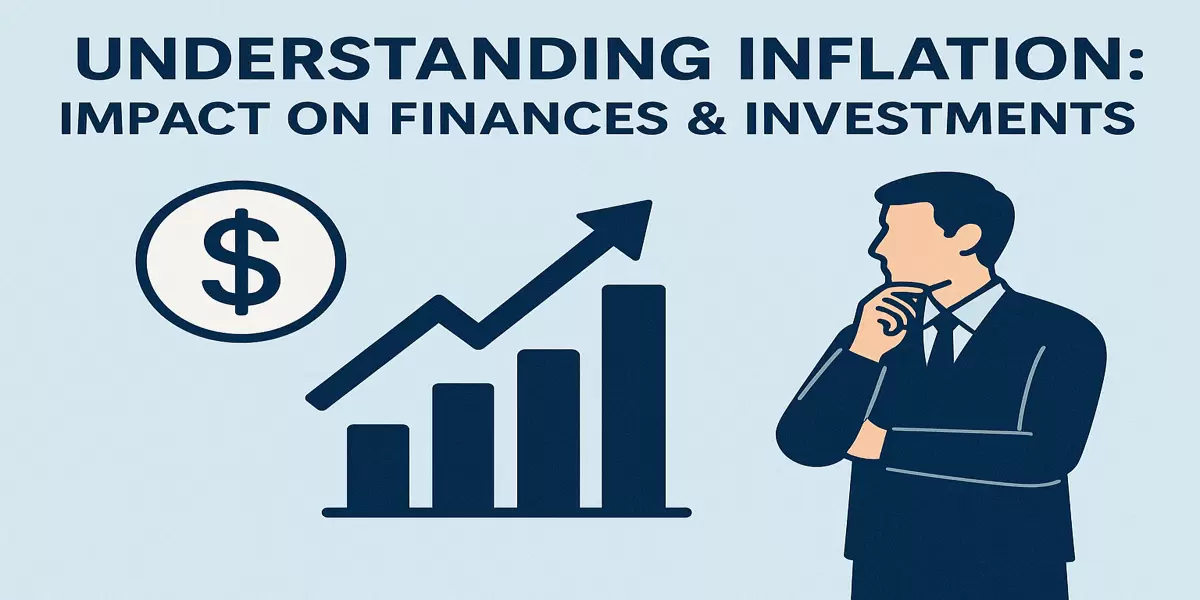
- Erigo India
- 08-Apr-2025
- Economy
Understanding Inflation: Impact on Finances & Investments
Table of Content
What is Inflation and how it Impacts your Finances
How Does Inflation Affect Purchasing Power?
Rising Inflation? Here’s How to Make Your Money Work Harder for You
Inflation Impacts Everything from Essentials to Investments
Beat Inflation with Effective Investment Strategies
How Inflation Affects Your Loan EMIs
What is Inflation and How it Impact Your Finances
Most people have heard of inflation but do not understand it properly. They may not be aware of how it affects their daily lives and financial health in the long run.
Whether paying rent, shopping for groceries or planning your retirement, inflation significantly shapes the financial world.
In this blog, let us explore inflation and how it erodes purchasing power. Also, learn how making wise decisions can help you protect your investments, loans and savings during rising inflation.
________________________________________________________
How Does Inflation Affect Purchasing Power?
Inflation can be explained as the rate at which the standard pricing levels for services and goods increase over time. In simple terms, this means that with the rise in inflation, you can purchase fewer services/goods in each unit of currency.
For instance, $100 could have fetched you a certain quantity of groceries last year. Well, this year, you may have to pay a little higher to buy the same quantity of groceries due to inflation. Even the slightest inflation can ruin the value of savings, making it difficult to maintain your current lifestyle.
To understand it better, let us understand this: if inflation is increasing at 3% yearly, what you purchased for $100 today would cost you $103 a year.
In a growing economy, inflation is a normal thing. But, when it increases too fast or for a longer span, it can decrease your purchasing power considerably.
So, for people with substantial savings or fixed incomes, the impact of inflation can be quite challenging.
Do not worry, there are strategies you can adopt to protect your savings against inflation.
You need to adopt a proactive approach to reduce the impact of inflation so that you can protect your savings.
Just keeping your money in your savings account for a low interest will not protect it from rising inflation. This means if your savings do not increase at a rate that is higher than inflation, the purchasing power will gradually ruin with time.
Strategies that can help protect your savings
Think about Stock Market Investments
Ideally, stocks can fight against inflation in the long run. Well, in the short term, the stock market can turn volatile, but in the long term, equities overtake inflation.
During inflation, companies can increase their prices which fetches them increased revenues & profits. It is important to choose stocks smartly and own a diversified portfolio to mitigate risk.
Consider investing in Inflation-Protected Assets
Investing in assets that are likely to perform better during inflation is the perfect way to safeguard your savings from rising inflation. It includes inflation-protected securities such as TIPS (Treasury Inflation-Protected Securities) or specific bonds. Such investments adjust the value with inflation so that your returns match the increasing price.
Consider Real Estate Assets
Investing in real estate is one of the best ways to beat inflation. Certainly, property values increase with time and so does the rental income with inflation. Hence, investing in real estate is a perfect option to combat the rising prices. Before investing in real estate, do not forget to consider location and market conditions.
Rising Inflation? Here’s How to Make Your Money Work Harder for You
In situations where inflation is increasing, take smart steps to ensure that your money works harder.
When it comes to inflation, it can reduce cash savings value. On the other hand, it can bring in many growth opportunities if you plan your finances smartly.
Maximize Tax-Advantaged Accounts
You can grow your savings by using tax-advantaged retirement accounts efficiently. Tax savings can be quite valuable in situations when inflation is on the rise. The tax-advantaged retirement accounts make your investment grow tax-free and beat inflation.
Concentrate on High-Interest Debt
If you are under heavy interest debt specifically credit card debt, make sure you pay it on time. Once the interest rate on your debt increases, it will be more costly as inflation shoots up the prices. So, make sure you reduce your high-interest debts. It will ensure that your savings and investments are not overburdened and offer financial stability in the long run.
Diversify Your Portfolio
Fighting Inflation becomes easy when you diversify your portfolio. You can spread your investments over multiple assets. For example, in categories like commodities, bonds, real estate, stock, etc. It helps reduce the risk as any one of your assets will be immensely affected by inflation. It means that with a diversified portfolio, you will witness growth in one section, even if inflation affects another.
Inflation Impacts Everything from Essentials to Investments
Inflation not just affects investments but almost every aspect of financial life. Yes, from groceries to fuel, inflation can impact every expense making it more costly.
Increasing Services/Goods Costs
With the rise in inflation, you will witness price hikes across essential food items like milk and eggs to other expenses like entertainment and travel.
So, if your earnings do not increase at the same rate as inflation, meeting your monthly expenses will be difficult. You may need to stretch your budget to fulfil your monthly expenses.
Impact on Fixed Income
If you are dependent on a fixed income, inflation can be quite challenging. For example, retired people who are dependent on their pensions may have to face challenges as their income does not increase with rising inflation.
As the cost of living increases and fixed income remains the same, they need to consider their spending patterns. They can find different alternatives to add to their income to match the inflation.
Impact on Investments
Inflation can reduce your investment returns. The investment returns should match the inflation rate. If that does not happen, your portfolio may not perform well over time. So, reconsider your investment and make necessary adjustments to make sure your portfolio overtakes inflation.
___________________________________________
Beat Inflation with Effective Investment Strategies
Making the right financial choices can help safeguard your financial future during inflation. The most effective investment strategies that you can consider include mutual funds, fixed deposits and real estate.
Let us have a look at a comparison of how each of the above options makes sense in an inflationary situation.
Fixed Deposits
FDs come with low risks. FDs allow you to deposit a certain amount for a fixed period and earn interest. Undoubtedly, FDs are safe investments, but the returns may not match the rising inflation. When interest rates are lower than the inflation rates, you lose purchasing power in the long run. However, if you want to avoid risk and want to receive a guaranteed return, then FDs are a great choice.
Real Estate
Real estate is, ideally, a powerful shield against inflation. The value of property increases with inflation, and so does the rental income with time. Well, real estate requires you to invest significant money. It can be a stable investment in the long term. Also, as compared to the stock market, real estate investment is less volatile, making it the perfect choice for those searching for a tangible asset.
Mutual Funds
When it comes to mutual funds, you can get higher returns than fixed deposits, especially if you choose to invest in equity mutual funds. Generally, stocks overtake inflation in the long run. Hence, investing in equity-based mutual funds can boost your wealth while fighting inflation. The risk level while investing in mutual funds is higher. Hence, it may not be the ideal choice for those with a low tolerance for market volatility.
_______________________________________________
How Inflation Affects Your Loan EMIs
Not to forget but inflation can also affect loan repayments. Inflation can increase the interest amount you pay against loans, mainly for variable interest rates. Let us learn how:
Increasing Interest Rates
To control inflation, central banks increase interest rates. If you have opted for loans with variable rates, for example, personal or home loans, the interest rate can increase, thereby increasing your EMIs (monthly repayments). It can directly affect your saving pattern and budget.
Fixed-Rate Loans
In case you have opted for fixed-rate loans, the EMIs will remain the same irrespective of inflation. It would be beneficial in cases where inflation shoots up interest rates as you would be able to predict your loan repayments.
Conclusion
Inflation impacts almost every element of your financial life. It includes anything from the cost of groceries to investment returns.
While inflation can ruin your purchasing power, it is important to understand how inflation works so that you can take proactive steps to safeguard your finances.
It is important to stay informed and adapt to strategies that help you overcome inflationary pressures and let your money work for you in times of inflation.
